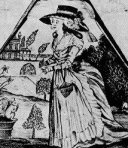|
|
 |
 |
|
Reading Guide |
| 4. |
Woman's Role in the Republic
| - | Abigail Adams, Letters to/from John Adams and John Quincy Adams, 1776, 1780, 1783, excerpts |
| - | Dr. Samuel Jennings, The Married Lady's Companion, 1808, excerpt |
|
|

"Keep within Compass"
ca. 1795 (detail)
|
Let us not forget the ladies. During the post-Revolutionary period women remained subordinate to men, but after the turn of the century their subordination became constructed in a new way. Broadly speaking, the "Republican motherhood" of the immediate postwar period shaded into the "true womanhood" of the early nineteenth century. The roles are not sharply distinguished. Both, for example, attended to the domestic sphere and to matters moral and religious. The difference between them lay in the way they engaged the world beyond the home. Republican mothers would not be ignored. Inspired by the Revolution, they claimed a role in the civic ethos of the new nation. True women, on the other hand, were more passive. Inspired by evangelicalism, they focused on home and family. The selections provided here illustrate the contrast.
Abigail Adams, wife of John Adams and mother of John Quincy Adams, is a model republican mother. Intelligent and well read, she employs the rhetoric of the Revolution to address issues of power between men and women. Even when she writes of virtue and religion, she does so with an eye toward their relationship to power and the uses to which it is put in the public sphere. The Married Lady's Companion was written by a well-meaning physician primarily to instruct poor women on pregnancy, birth, midwifery, and raising children (especially daughters). He devotes one chapter to "The Proper Conduct of the Wife towards Her Husband." In its own way it urges women to pay attention to power, but here it is emotional power, deployed in the private sphere to move a husband to accede to his wife's wishes or to avoid a wife's ruin. "When you become his wife," Jennings intones, "he became your head." Accessible and provocative texts for students. Useful to compare with the women's roles in Tyler's play The Contrast (see the Predicaments section). 10 pages.
Discussion questions
| · |
What does Abigail Adams want to teach her son? In what ways is she serving the role of "republican motherhood"? |
| · |
How does she link the religious, the personal, and the political in her letters to her son? |
| · |
What is she warning against in her letters to her son? |
| · |
In her letters to her husband, what specifically is Abigail Adams asking for? |
| · |
How does John Adams respond to her, and how does she respond to his response? |
| · |
How are men and women portrayed in Abigail Adams's letters and in The Married Lady's Companion? |
| · |
Describe a conversation between Abigail Adams and Samuel Jennings on women as political beings. |
| · |
How would Maria and Letitia in The Contrast contribute to this conversation? |
| · |
If these texts were primers for women on using power as subordinates, what would they teach? |
| · |
Where is the issue of equality in these texts?
|
» Link |
 |
 |
Topic Framing Questions
| • |
What notions of equality were held by early republican leaders? free black men? white women?
|
| • |
How did their notions of equality and rights correspond? |
| • |
How did each group mold its public voice? How did each use its power? |
| • |
To what extent did America succeed in "living the revolution" by 1820? |
|
|
 |
 |
|
 |
